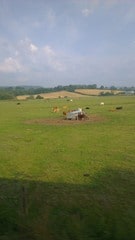Landlords generally retain rights to enter rented premises for reasonable purposes, but that does not always sit easily with the entitlement of tenants to quietly enjoy the property they pay for. Exactly that difficulty arose in a High Court case concerning farmland which was targeted for housing development.
 The case concerned a farm of about 240 acres on which outline planning consents had been granted for construction of a large number of homes as part of a proposed garden city. The farm, or all but a small part of it, was held under two leases dating from the 1960s which conferred on the landlord, and others authorised by the same, rights to enter any part of the land at all reasonable times for all reasonable purposes.
The case concerned a farm of about 240 acres on which outline planning consents had been granted for construction of a large number of homes as part of a proposed garden city. The farm, or all but a small part of it, was held under two leases dating from the 1960s which conferred on the landlord, and others authorised by the same, rights to enter any part of the land at all reasonable times for all reasonable purposes.
The tenant, who farmed in partnership with his son, had objected to the number of visits paid to the farm by surveyors, ecologists and others intent on performing preparatory work for the development. In those circumstances, the landlord sought a permanent injunction requiring the tenant to grant entry to such persons as and when reasonably required.
In ruling on the matter, the Court accepted that the landlord’s rights of entry extended beyond purposes specifically mentioned in the tenancy agreements, such as the repair of buildings, and encompassed entry for inspection or observation. Those rights were sufficiently broad to enable, for example, the installation of monitoring devices, including remote bat detectors.
However, the Court found that the rights of entry did not extend to intrusive activities that were liable to cause damage to the land, interfere with ordinary farming activities or otherwise impinge upon the tenant’s quiet enjoyment of the land. Such activities would include cordoning off parts of the land, the sinking of boreholes and the erection of structures or foundations.
The Court made declarations that reflected its conclusions, but declined to issue the injunction sought. Although the tenant had not always sought to make life easy for the landlord, he had quite reasonably sought to ensure that he was not taken advantage of and that the landlord did not exceed its lawful rights of entry without paying compensation. There was no strong probability that, unless restrained by injunction, the tenant would infringe the landlord’s rights.



